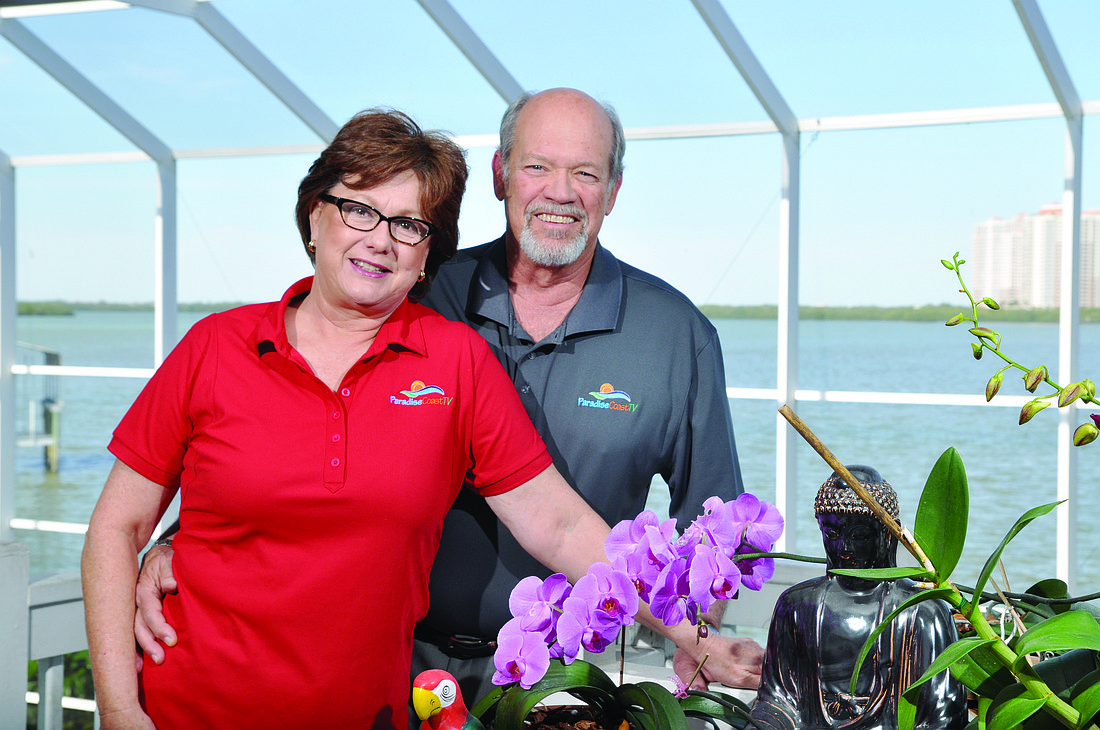- November 28, 2024
-
-
Loading

Loading

If you’ve ever stayed in a hotel in Naples or Marco Island, chances are you’ve watched Paradise Coast TV.
It’s the 24-hour channel that shows advertising from local restaurants, shops and other businesses that cater to visitors. Now, tourists who visit Sarasota can start watching it in their rooms, too.
“We’ve already got 13 hotels installed,” says Mark Romary, the partner in the venture who is expanding the firm’s reach to Sarasota.
Already, the Bonita Springs-based company provides advertising and short feature programs on a channel inside 37 hotels totaling 4,500 rooms from Marco Island to Naples and Bonita Springs.
“The dream is to have it from Tampa-St. Pete to Marco Island,” says Larry Lancit, who started the company with his wife, Cecily, in 2010.
Paradise Coast TV expects to exceed $300,000 in revenues in 2014, double what the company posted in 2013. With the expansion to Sarasota, that could rise to $500,000 in 2015, the Lancits say.
The challenges and opportunities for Paradise Coast are the same as they are for other communications companies: rapid changes in technology.
When hotels contract for cable television, they often receive a channel for their own use. The Lancits produce a video about the hotel and offer short features of the area in exchange for the use of that channel. They make money by selling advertising on the channel, which costs $550 a month for a one-minute commercial that runs 24 times a day, seven days a week.
But the changes in technology mean more hotels are upgrading their systems to digital services. With the previous cable systems, the Lancits only needed to plug in a DVD player and run the programming on a continuous one-hour loop.
Now, the hardware could cost as much as $1,000 per hotel to plug into a digital system, plus additional costs such as software to run the programming. In all, the Lancits say it could mean a capital investment of $50,000 to $100,000.
“It’s expensive to run a network like that,” says Larry Lancit.
Still, the benefits of digital systems could outweigh the high cost of entry. That’s because the Lancits could alter the programming remotely from their desktop computer, offering promotions for specific events or days depending on the customer’s needs at the click of a mouse. Currently, the staff of Paradise Coast TV has to visit each hotel once a month to swap out the DVD with a new one.
Although hotels are switching to digital technology, the transitions are sometimes challenging.
“It’s not a question of ‘Let’s attach those wires,’” says Larry Lancit. Each hotel has its own system requirements and quirks.
“They’re all idiosyncratic,” Cecily Lancit says.
While it sorts out the technology challenges, the company is expanding its reach to Sarasota, where it already has established itself in about 2,000 rooms.
“It takes 2,000 rooms to give penetration to an advertiser,” Romary explains.
Print publications remain the Paradise Coast TV’s main competition, not rival broadcasters.
“People have the impression that print has always worked better,” Larry Lancit says.
For now, most of the hotels that are participating with Paradise Coast TV are along the Interstate 75 corridor.
“The beach area is the epitome of where we want to be,” says Romary.
Besides the hotel channel, the Lancits have been growing their production services. The couple is not new to television production. Before they moved in 2002 to Naples, the couple produced Emmy Award-winning children’s shows for PBS, including “Reading Rainbow” and “Backyard Safari.”
“We’ve got a good model,” Larry Lancit says.